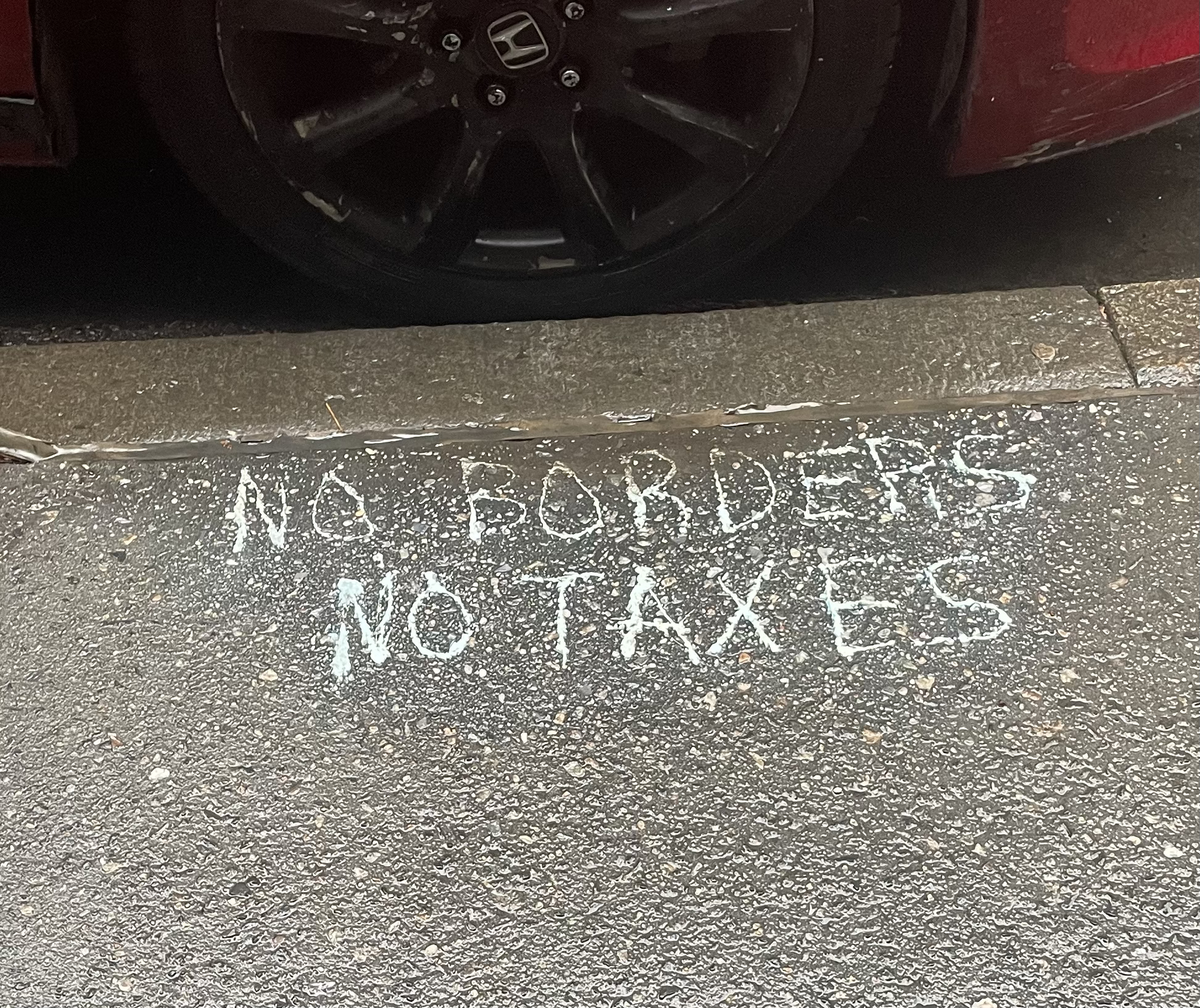Today’s fraudulent multiculturalist faith fragments society—and fractures the psyche.
No Borders, No Taxes

A government that won’t perform basic functions doesn’t deserve to rule.
The principle of “No Taxation without Representation” is central to the American understanding of the political compact between the people and the state. Paying taxes without having a say in the rate of levy or how the revenue is spent is no different from tribute or ransom. As early American patriot James Otis put it in the 1760s, “Taxation without representation is tyranny.”
The citizens of Washington, D.C. added the phrase “Taxation without Representation” to their license plates in 2000, in protest over their lack of voting representatives in the national legislature. The point is fair, though could be addressed by returning the habitable portions of the District to Maryland, absorbing the population there, and reapportioning the Free State’s congressional representation accordingly.
I saw a bit of graffiti on the sidewalk in New York this week. It read “NO BORDERS NO TAXES.” My first thought was that it was along the lines of “Build bridges, not walls,” or “Ningun ser humano es ilegal,” or “No borders, no nations, F— your deportations.” This kind of Antifa sentiment is common around lower Manhattan, where during the mostly peaceful riots of 2020 the nearby Washington Square Arch was constantly defaced with “Stolen land,” “All cops are bastards,” “F— 12!” and similar apothegms.
But on reflection, I realized that “NO BORDERS NO TAXES” doesn’t sound like something Antifa would say. They promote wholesale wealth confiscation. They like taxes, especially because they don’t really pay any. So, if our graffiti artist was an Antifa enthusiast, he didn’t think it through.
On the other hand, if read with an implied comma, “NO BORDERS, NO TAXES” is an argument with a logical structure. It says, “If you are going to run a country without defending the borders, then we the people shouldn’t have to pay any taxes.” The basis of taxation is the quid pro quo. But the self-inflicted border crisis demonstrates a major failure of the compact. As a man whom many considered great said recently, “If you don’t have borders, you don’t have a country.”
That is where we increasingly find ourselves. At least a quarter of a million migrants are crossing the borders every month, that we know of. Nobody knows who they are or what they are running away from. We don’t know if they have any skills or diseases, if they have killed people, or are just tired of living in poverty. The level of scrutiny for legal immigrants at Ellis Island 125 years ago was orders of magnitude greater than what is happening now.
It was reported in New York City the other day that the city is violating its own right-to-shelter laws because battered women seeking emergency shelter are being turned away. The women’s shelters are already full, not of abused women, but male migrants who have been given priority. New York’s $3 billion homeless services complex no longer can afford to shelter a female victim of intimate partner violence, so she has to sleep in her car in winter, while one of thousands of male “asylees” sleeps in her rightful bed.
Uncontrolled borders are characteristic of failed states. Our regime’s failure to maintain the security of the homeland—in the only real sense—is a mark of its illegitimacy. Let NO BORDERS, NO TAXES ring out as our new cry for liberty and common sense before America disappears.
The American Mind presents a range of perspectives. Views are writers’ own and do not necessarily represent those of The Claremont Institute.
The American Mind is a publication of the Claremont Institute, a non-profit 501(c)(3) organization, dedicated to restoring the principles of the American Founding to their rightful, preeminent authority in our national life. Interested in supporting our work? Gifts to the Claremont Institute are tax-deductible.
Radical self-definition destroys the self and the nation.
The 1776 Report demonstrates a more sophisticated grasp of history than that of its critics.



